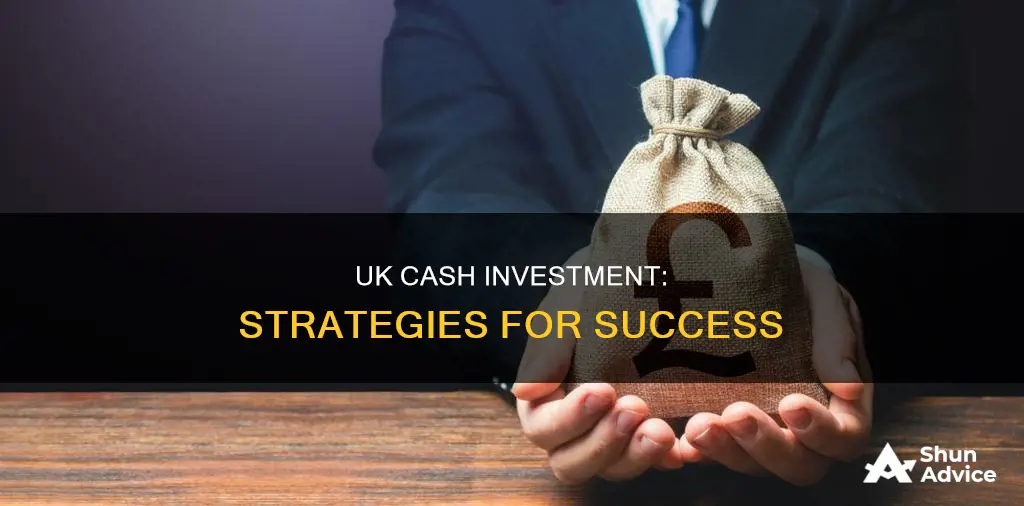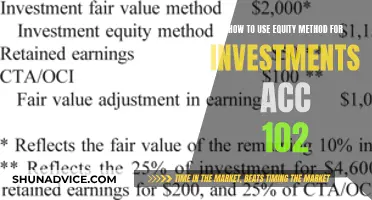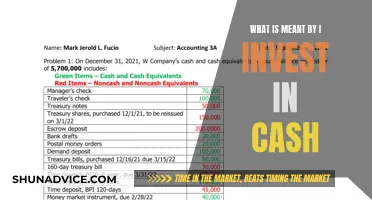
With inflation eroding the value of cash over time, investing is a way to preserve and grow your money. There are many options for investing in the UK, each with its own advantages and considerations. Here are some of the most popular ways to invest your money:
- Stocks and shares: Investing in stocks and shares can give you better returns than cash savings if you're prepared to take a risk and have a long-term approach. You can buy and sell individual company shares through an online platform or stockbroker, or invest in funds that pool money from multiple investors to buy a diversified portfolio of stocks.
- Exchange-Traded Funds (ETFs): ETFs are similar to investment funds but are traded on the stock exchange. They offer diversification and flexibility by tracking various indices or assets.
- Stocks and shares Individual Savings Accounts (ISAs): ISAs are tax-efficient investment accounts that allow you to invest in stocks, shares, investment funds, and ETFs. Any returns generated within the ISA are tax-free, making it one of the best long-term investment options.
- High-interest savings accounts: These accounts can provide low-risk investments with competitive interest rates. Options include notice accounts, fixed-rate bonds, and cash ISAs, each offering different levels of flexibility and interest rates.
- Children's savings accounts: These accounts offer more competitive interest rates than adult savings accounts, making them a good way to invest in your child's future. Junior ISAs and stocks and shares junior ISAs are popular choices.
- Lifetime ISAs (LISAs): LISAs are designed for people aged 18-40 to help them buy their first home or save for retirement. While there is a limit on how much you can save annually, the government will add a 25% bonus to your savings, up to a certain amount.
- Pensions: Paying into a pension is a popular way to invest for retirement, with options such as Self-Invested Personal Pensions (SIPPs) offering more control over your investments.
- Peer-to-peer lending: This involves investing in a business or project that needs capital to grow, offering the potential for high returns. However, it's important to carefully assess the risks before committing your funds.
| Characteristics | Values |
|---|---|
| Risk tolerance | It's important to understand the risk involved and how much risk you're comfortable taking. |
| Amount of money | Some investments may require a minimum balance or initial investment. |
| Timeline and financial goals | Experts recommend maintaining investments for at least five years to balance out any rises or falls in the market. |
| Savings goals | It's important to know what your savings goals are to choose the most suitable savings or investment option. |
| Emergency fund | It's recommended to have an easily accessible emergency fund of around three to six months' net income to cover any emergencies. |
| Existing debt | It may be sensible to focus on paying off debt before investing. |
| Tax-efficiency | Tax-efficient wrappers, such as ISAs and pensions, can protect your investment returns from taxes. |
| Diversification | Diversifying your investments across different asset classes, sectors, and countries can help level out fluctuations and falls in prices. |
| Investment platforms | Online investment platforms, such as Hargreaves Lansdown and AJ Bell, offer a range of investment options and services. |
| Investment amount | Consider whether to invest a lump sum or regular contributions, depending on your risk tolerance and available funds. |

Stocks and shares
There are two ways to make money from investing in shares. One is if the shares increase in value, meaning you make a profit when you sell them. The other is if they pay dividends. Dividends are like interest on a savings account. If a company makes a profit, it can choose to give some of it back to you – this could be on a regular basis or as a one-off. The first £2,000 per year paid in dividends is tax-free in the UK, after which it's taxed at 7.5% for basic-rate taxpayers, 32.5% for higher-rate taxpayers, and 38.1% for additional-rate taxpayers.
There are a few different ways to buy and sell shares:
- Via an online investment platform or trading app
- Through an appropriate stockbroker
- With the help of a financial advisor
When deciding how to invest, it's important to consider the fees involved. There are several types of fees that may be charged when buying, holding, and selling shares:
- Platform charge: a monthly, quarterly, or annual account fee, either as a flat fee or a percentage of your investments
- Trading fees: the fee you pay each time you buy or sell shares, with discounts often available for frequent traders
- Transfer out/exit fee: charged by some platforms if you want to transfer your investments to a different provider or close your account
- Stamp duty: when purchasing UK shares, you'll typically pay 0.5% stamp duty and an extra £1 on transactions above £10,000
Before investing in shares, it's important to remember that there are no guarantees—the value of your investments can go down as well as up. It's generally recommended that you invest for at least five years, which gives you time to ride out any short-term fluctuations in the market. You should also make sure you have an emergency fund of three to six months' worth of living expenses saved up before investing.
If you're new to investing, it's a good idea to do your research and consider seeking independent financial advice. It's also worth noting that you can invest in shares directly or indirectly. Direct investment involves buying shares in individual companies, while indirect investment involves investing in funds, which are professionally managed baskets of shares and other assets such as bonds and property.
Best Places to Invest Your Cash Today
You may want to see also

Savings accounts
There are several types of savings accounts to consider, including:
- Instant access accounts — these are best for emergency funds.
- Fixed-rate bonds — these offer higher rates if you tie in a lump sum for an agreed period.
- Cash ISAs — these are best for tax-free savings.
- Regular savings accounts — these are good for getting into the savings habit.
If you have a lump sum, you might want to consider investing your money in notice accounts or fixed-rate bonds. Notice accounts provide the flexibility of being able to access your money after a set notice period and typically offer competitive variable interest rates. Fixed-rate bonds allow you to lock your money away for a set time at a rate that won't change until your account matures. This stability makes them attractive during uncertain times or when interest rates are falling, as they ensure a guaranteed return on your investment.
Cash ISAs, or Individual Savings Accounts, are similar to traditional savings accounts but provide the benefit of tax-free savings. There's an annual limit of £20,000 on your deposits. There are three main types of cash ISA, each catering to different investment needs:
- Instant access cash ISA — allows you to deposit and withdraw money at any time without penalty, although this might be limited by your ISA provider.
- Regular savings ISA — typically offers a fixed rate of interest as long as you deposit an agreed amount each month.
- Fixed-rate cash ISA — you lock your money away for a set period to earn a competitive interest rate. The longer the term, the higher the interest rate.
You can distribute your £20,000 ISA allowance across different ISA account types, as long as they are opened in different tax years. For example, you might opt to spread your risk by investing part of your annual ISA allowance in a stocks and shares ISA and the remainder in a cash ISA.
Whether it's better to put your money into an ISA or a savings account depends on your individual circumstances. The main advantage of an ISA over a savings account is that you can save up to £20,000 tax-free. However, savings accounts typically offer higher rates of interest. It's also worth remembering that the personal savings allowance (PSA) means many people won't pay tax on their savings anyway. The PSA allows basic-rate taxpayers to earn up to £1,000 of interest per year without paying any tax, while higher-rate taxpayers can earn up to £500 per year tax-free.
Invest to Conceal Cash: Strategies for Discreet Money Management
You may want to see also

Pensions
Pension funds are a long-term investment, and it's usually not possible to access the money in your pension pot until you're at least 55 years old. This means that pension funds can be invested differently from short-term savings, which you might need to access at short notice.
If you have a workplace pension, your money will usually be automatically invested in a 'default' fund chosen by the pension scheme to meet the investment needs of most members. You can choose to invest in a different fund if you prefer, but you should always check the level of risk involved.
If you're happy with the default fund, you don't need to do anything more than carry on contributing. However, it's worth regularly reviewing your pension investments to make sure you're still comfortable with the level of risk and that charges haven't gone up.
If you set up a pension yourself, you'll usually need to make a choice upfront about how to invest the money. Pension providers will usually offer a range of investments and some support to help you choose.
When deciding how to invest your pension, there are several things to keep in mind:
- The period of time you intend to invest for
- Spreading your money between different types of investments
- Reviewing your investments regularly
- The level of risk you're comfortable with
- Diversifying your investments to minimise the impact of market volatility
Restricted Cash: A Viable Investment Option?
You may want to see also

Investment funds
When you invest in an investment fund, you are essentially purchasing shares, which can rise or fall in value. You have no control over which companies' shares are purchased, as active investment funds usually have a fund manager who manages every transaction. Investment funds are typically made up of a mix of investments, which means that the fund is diverse in nature. Diversifying is often considered to lower the risk of an investment portfolio because if one company you have shares in fails, your other shares or investments may be able to make up for that loss.
There are two types of investing: active and passive. Active investing involves a fund manager actively managing the fund or account, whereas passive investing involves automatically tracking a particular index, such as the S&P 500. Active investment aims to outperform an index or other benchmark, while passive investments only seek to track the index they are following. Active investing is also more expensive and less flexible than passive investing, as fund managers can choose which investments to add to the fund. Historically, active investments have performed worse than passive investments over both short and long periods of time.
There are several types of investment funds:
- Exchange-traded funds (ETFs) are investment fund shares traded on stock exchanges, much like individual stocks. They can track a wide range of indexes, from broad market indexes to specific sectors, commodities, or even geographical regions.
- Open-ended funds are institutions that redeem their shares based on each day's closing net asset value (NAV). There is no cap on how much an investor can pay in, as there is a theoretically unlimited number of potential shares available.
- Closed-ended funds raise money through an initial public offering (IPO) and sell a fixed number of shares at one time, with a cap on how much money can be invested. Once the limit is reached, the fund is closed to further investors, and existing investors cannot sell their shares until the fund is liquidated.
- Mutual funds are the oldest type of investment fund. The total money invested is pooled and used to purchase baskets of shares, with shares priced and sold on a daily basis.
- Hedge funds are designed for professional investors with a high-risk appetite. Their main goal is to generate big returns, regardless of which way the stock market flows.
- Index funds, or tracker funds in the UK, aim to replicate the performance of a specific market index. This passive management approach typically results in lower fees than active funds.
Cash Investment: Revenue or Asset?
You may want to see also

Share dealing accounts
Share prices fluctuate throughout the day on the stock exchange, and there is potential for capital gains if your stock investments rise in value over time. However, there is also the risk of capital losses if the company's value drops.
If you're considering investing in shares, it's important to understand the risks involved. Share prices can be impacted not only by the performance of the stock market as a whole but also by company-specific factors. To mitigate this risk, it's advisable to diversify your portfolio by investing in a range of companies across different sectors and countries.
Before investing in shares, ensure you have an emergency fund in place, covering three to six months' worth of living expenses, and consider whether you have any high-interest debts that you should prioritise paying off. Remember, investing in shares is typically recommended for those with a long-term investment horizon of at least five years.
Uncertain Future Cash Flows: Navigating Investment Project Analysis
You may want to see also
Frequently asked questions
This depends on your financial situation and risk tolerance. It's important to assess your overall financial situation and consider how much money you can afford to lose. Generally, you should only invest money that you can afford to live without for at least five years.
There are several investment options available in the UK, each with its own advantages and considerations. Here are a few popular ones:
- Stocks and shares: Investing in the stock market is a common way to grow your money over time. You can invest in individual company shares or through investment funds that pool money from multiple investors.
- Savings accounts: These are generally low-risk and provide predictable returns. Options include instant access accounts, fixed-rate bonds, and cash ISAs.
- Pensions: Paying into a pension is a tax-efficient way to invest for your retirement. Options include workplace pensions and self-invested personal pensions (SIPPs).
- Peer-to-peer lending: This involves investing in a business or project and receiving your money back with interest if the investment succeeds.
Here are some key things to consider before investing:
- Risk tolerance: Understand the risks involved and the amount of risk you're comfortable taking.
- Financial goals: Define your short-term and long-term financial goals to help you choose the most suitable investment options.
- Timeline: Consider how long you want to invest your money for. Experts often recommend maintaining investments for at least five years to balance out any rises or falls in the market.







